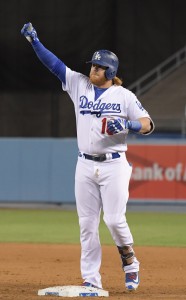Last night, Edwin Encarnacion agreed to a three-year, $60MM contract with the Indians that contains a club option for a fourth year which would bring the deal to a total of $80MM over four years. The contract fell shy of expectations for Encarnacion, whose free-agent stock was damaged due to his age, draft pick compensation and a market flooded with sluggers capable of splitting time between first base and designated hitter. In the hours since that pact was reached, Cleveland has drawn widespread praise for the deal, and agent Paul Kinzer has publicly given some insight into the final stages of negotiations that led up to the deal. Here’s a roundup of some context on the signing, reactions to the deal and the impact it’ll have on the remainder of the first base/DH market…
- In an appearance with Jim Bowden on MLB Network Radio, Kinzer stated that both the Athletics and Rangers remained in the mix for Encarnacion’s services until the final decision to take Cleveland’s offer (audio link). According to Kinzer, A’s president of baseball ops Billy Beane got creative and made offers with a high average annual value over a short term. Kinzer says that Encarnacion turned down more money from Oakland, though prior reports suggest that Oakland was only willing to offer two years. It’s quite possible, of course, that Kinzer was simply referring to “more money” on an annual basis. Indeed, the AAV in the A’s offer was $25MM at what is believed to be a shorter (presumably, two-year) term, according to Ben Nicholson-Smith of Sportsnet.ca (via Twitter). The agent also noted that Cleveland’s proximity to the Dominican Republic (relative to Oakland) was enticing for Encarnacion, who wanted to limit travel obligations for his family as best he could.
- The Rangers’ final proposal was “well within the Indians’ neighborhood,” according to Jeff Passan of Yahoo Sports, though precise details remain unknown. Texas long presented a public stance that downplayed the likelihood of landing Encarnacion, though it certainly seems that the organization put together a competitive effort. Interestingly, Passan adds that, by the end of the Winter Meetings, the market for the veteran slugger had slowed to the point that some (unidentified) team felt it reasonable enough to dangle a three-year, $42MM offer.
- Clearly, the market rebounded from that point, but Encarnacion never saw the kind of cash that the Blue Jays had initially put on the table. Toronto’s reported four-year, $80MM offer to Encarnacion earlier in the offseason may well have had an additional wrinkle, per Sportsnet.ca’s Shi Davidi (video link via Twitter). Though the guarantee was indeed $80MM, the Jays were also interested in including a fifth-year option that could have brought the total value up to $100MM. Depending upon the structure of the deal — including how the option could be exercised and what portion of the guarantee would have been included as a buyout — the presence of such a provision could conceivably have slightly improved or reduced the value of the overall potential contract from Encarnacion’s perspective.
- The Cardinals explored Encarnacion’s market and had “mild” interest in the slugger, one source tells Derrick Goold of the St. Louis Post-Dispatch (Twitter link). The P-D’s Jeff Gordon, though, opines that Encarnacion was never a good fit in St. Louis due to the team’s pre-existing infield logjam. St. Louis already has Matt Carpenter at first base, Kolten Wong at second, Aledmys Diaz at shortstop and Jhonny Peralta at third base, while Jedd Gyorko figures to function as a super-utility option. Matt Adams currently projects as a bench player. Adding Encarnacion into that mix would’ve only resulted in further complications and forced what could possibly have been multiple trades, none of which would’ve necessarily been easy to facilitate.
- ESPN’s Keith Law calls the signing a “colossal coup” for the Indians (ESPN Insider subscription required and strongly recommended), opining that Encarnacion will be worth an extra two to three wins during the regular season over the player he is effectively replacing: Mike Napoli. Returning to the postseason in the first year of the deal would recoup much of the $60MM guarantee Encarnacion received, and that’s worth the risk that Encarnacion won’t be a $20MM player in the third year of the deal, Law continues. He calls the Blue Jays the biggest losers in this situation, noting that the team paid more than half of Encarnacion’s guarantee for a player (Kendrys Morales) that may not be one-quarter as productive, citing Morales’ recent struggles in 2014 and the early portion of the 2016 season.
- Law’s colleague Buster Olney argues differently from the Blue Jays’ vantage point (Insider also required), writing that Toronto president Mark Shapiro and GM Ross Atkins weren’t in position to expect Encarnacion’s market to collapse in this fashion. Olney adds that among agents and teams around the league, the three-year, $33MM contract the Jays issued to Morales is viewed as a “solid move,” though it goes without saying that a number of teams likely feel differently. (Toronto, after all, outbid all other interested parties, suggesting that plenty of teams wouldn’t be comfortable at that rate.) Still, I agree with Olney’s take that Encarnacion’s market collapse was surprising; few projected that high-payroll fits like the Yankees, Red Sox and (to some extent) Rangers would all balk at a long-term investment for a player of Encarnacion’s caliber. And Olney rightly points out that the new Jays’ front office has made some nice value adds since taking over, citing the reasonable contracts given to J.A. Happ and Marco Estrada.
- The agreement is good for both Encarnacion and the sport, argues FOX’s Ken Rosenthal, who notes that it’s refreshing to see a pair of low-payroll clubs like the Athletics and Indians as finalists for one of the market’s top free agents. While he’s quick to note that he’s not suggesting the new CBA has leveled the playing field between high-revenue and low-revenue clubs, the fairly minimal increases to the luxury tax threshold (and boosted penalties) do appear to have impacted clubs like the Yankees and Red Sox and the way in which they’ve approached their offseason dealings — though, perhaps, that was driven largely by both organizations’ preexisting motivations to reset their base tax rate by dipping under the luxury line for at least one year. Then again, the Red Sox in particular never seemed likely to pursue a long-term commitment at the DH spot, based on myriad reports out of Boston. And another suitor that went a different direction, the Astros, aren’t near the current luxury tax threshold, so the CBA’s impact on them probably wasn’t much of a factor.

